雅思口语内部讲义.pdf
雅思口语讲义
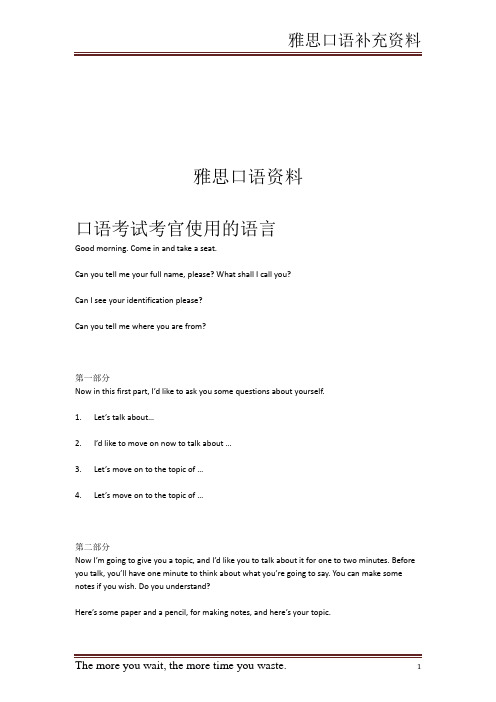
雅思口语资料口语考试考官使用的语言Good morning. Come in and take a seat.Can you tell me your full name, please? What shall I call you?Can I see your identification please?Can you tell me where you are from?第一部分Now in this first part, I’d like to ask you some questions about yourself.1. Let’s talk about…2. I’d like to move on now to talk about …3. Let’s move on to the topic of …4. Let’s move on to the topic of …第二部分Now I’m going to give you a topic, and I’d like you to talk about it for one to two minutes. Before you talk, you’ll have one minute to think about what you’re going to say. You can make some notes if you wish. Do you understand?Here’s some paper and a pencil, for making notes, and here’s yo ur topic.......All right? Remember you have one to two minutes for this, so don’t worry if I stop you. I’ll tell you when the time is up. Can you start speaking now, please?......第三部分We’ve been talking about …… and I’d like to discu ss one or two more general questions related to this.SportsUseful words场地表达The playing area for football, rugby, hockey and cricket is called a pitch; For tennis, volleyball, basketball, squash and badminton it is a court;for golf it is a course.裁判Football, rugby and hockey have a refereebut tennis, cricket and baseball have an umpire.球类队形He plays in attack. He is an attacker / striker.He plays in midfield. He is a midfielder.He plays in goal. He is a goalkeeper.He plays wide on the left. He is a wide player / winger.He plays in defence. He is a defender.游泳形式When I started to swim, I could only do freestyle. But later I learned Breaststroke and backstroke. Now I am doing butterfly stroke which is the most tricky and energy-consuming style.运动装备Swimming-- swimming costume (women); trunks (men)Badminton-- racquet/racket; shuttlecockGolf-- club; golf balltable tennis bat; table tennis balltennis racket; shorts; trainers/sneakersfishing rod; linefootball-- football boots/soccer shoessnooker cue; snooker table; snooker ballsMusicMusic genresclassicaldescribes music that is considered to be part of a long especially formal traditionand to be of lasting value.bluesa type of slow, sad music, originally from the southern US, in which the singertypically sings about their difficult life or bad luck in love.rhythms and blues/R & Ba type of popular music of the 1940s and 1050s which has a strong beatpopmodern popular music, usually with a strong beat, created with electrical orelectronic equipment, and easy to listen to and rememberrock and roll/rock ‘n’ rolljazza type of modern music with a rhythm in which the strong notes are usually noton the beat and which is usually improvisedcountrypopular music which is based on a type of traditional music from the westernand southern USrap/hip-hopa type of popular music in which subject of the songs is often politics or societyand the words are spoken rather than sungdance musica type of music with a strong beat that people dance to in a clubfunka type of music, usually for dancing to, with a strong jazz-based rhythm and atune that repeats itselfgospela style of religious music originally performed by black Americansreggaea type of popular music from Jamaica, with a strong second and fourth beatNew Age musica type of music which is intended to produce a calm and peaceful state of mindOSToriginal sound track – film music词汇积累karaoke /,kær.i’əʊ.ki/ lyrics Karaoke originally came from Japan. He writes the lyrics for most of his songs.melodyHis songs are always strong on melody.composerBeethoven and Schumann were leading Romantic composers.conductorClassical music is played by an orchestra which is led by a conductor.orchestraShe is a cellist working in the city of Birmingham Symphony Orchestra.Singer-songwriterPhil Collins is a singer-songwriter, who writes and performs his own songs.例句Jay’s new album is Capricorn. The first track is my favourite, which I keep playing over and over again.I’ve just bought Cheong’s latest album. There’s a superb guitar solo right at the beginning. You’ll love it.I don’t like his new single much but it’s got such a catchy tone I can’t get it out of my head.I’ve heard that Backstreet Boys are going on tour later this year. They’re going to be playing at venues all round the country. I hope they do a gig somewhere near here. I’d love to see them.He used to be the lead singer in a rock ‘n’ roll band, but now he is a successful solo artist on his own way.FilmsTypes of filmcartoon / animated film cowboy film / western horror film science fiction / sci-fic action kung-fu / martial art thriller comedywar film historical / epics musicals documentary suspense disaster filmcrime / gangster costume film romance / love story ethic filmUseful words and expressionsspecial effectsThe special effects in Star Wars are amazing.plotI got a bit confused. The plot was too complicated for me.performanceJodie Foster won an Oscar for her performance in Silence of the Lambs.star (v.)Titanic starred Leonardo DiCaprio and Kate Winslet.characterThe film revolves around three main characters.castAnthony Hopkins heads the cast in this moving costume drama.trailerI saw a trailer for the latest Spielberg film.sceneIn the first scene, the camera moves slowly across the room.hilarious6This comedy is absolutely hilarious. I laughed all through it.on the edgeThe suspense had me on the edge of my seat.abruptThe abrupt ending of this film confused me.film (v.)Schindler’s Li st was filmed in black and white.on location / setThe Beach was mainly filmed on location / set in Thailand.farfetchedThe farfetched story of film has made it a total failure.grippingHarrison Ford protects an innocent boy who has witnessed a murder in this gripping thriller.punch lineI love anything that makes me laugh. I just love to hear jokes and funny punch lines.based onJurassic Park was based on a novel by Michael Crichton.dubI’d rather watch a film with English subtitles than on dubbed in to Chinese. nominateThe film has been nominated for three Oscars – best film, best actress and best original screenplay.play a roleSean Connery played the role of James Bond for many years.convincingZiyi Zhang’s performance in Memory of A Geisha was very convincing. theme songThe theme song of Titanic –‘My heart will go on’ was brilliant.Games & ToysGames you played in the childhoodhide-and-seeka children’s game in which a group of children hide in secret places and then one child has to go to look for themhopscotcha game played by children, who throw a stone onto a set of joined squares drawn on the ground and jump on one leg and then on two legs into each square in turn to get the stonemarblesa children’s game in which small round glass balls are rolled along the floor chase-and-tag / taga game played by two or more children in which one child chases the others and tries to touch one of themthe eagle and chicksan outdoor role-play game played by many children, with one child plays the role of eagle and tries to touch a child who plays the role of a chickfollow-my-leader / follow-the-leadera children’s game in which one child is followed by a line of other children, who have to copy everything the first child doeshoopla / ring tossa game in which a ring is thrown so that it falls over an objectblind man’s buffa children’s game in which one person has a cloth tied over their eyes and tries to catch the othersjacksa children’s game in which you throw a ball into the air and try to pick up a number of small metal or plastic objects with the same hand before catching the ball againrope jumping / rope skippinga game played by people jump in and out to skip a ropeleapfroga children’s game in which a number of children ben d down and another child jumps over them one at a timemusical chairsa game in which children walk around a group of chairs while music plays. When the music stops they have to sit quickly on a chair, but because there is always one fewer chairs than children, the child that is left standing must leave the gameToys you played in the childhoodbeanbag / sandbaga small bag filled with dried beans or sand which is used as a children’s toy dolla child’s toy in the shape of a small person or babydollhousea toy that is a very small house, often with furniture and small dolls in it. glove puppet / hand puppeta toy person or animal which has a soft hollow body so that you can put your hand inside and move its head and arms with your fingershula hoopa large ring, usually made of plastic, which children play with by putting it around their waist and moving their body so that it spinsjack-in-the-boxa children’s toy consisting of a box with a model of a person inside it which jumps out and gives you a surprise when the top of the box is raised kaleidoscopea tube-like toy that you look through to see different patterns of light made by pieces of colored glass and mirrorsrattlea wooden device that when turned round and round produces a noise like a series of knocksFood Cooking Methods 烹饪smoke 熏stir-fry 炒braise 焖stew 炖simmer 用文火慢炖deep-fry 油炸steam 蒸roast/bake 烤grill 直接用火烤pluck 拔毛peel 去皮shell 去壳mash 捣碎dice 切成颗粒slice 切片cut / chop 切块bone 去骨shred 切丝mince 剁成细碎crush 压碎fillet (鱼)去骨、内脏、鳞dress (鸡)去毛、内脏cleaver 掰开rince 冲洗remove stems 去根scoop up 捞起pour starch sauce over 打芡Flavor & Texture 口感和质地chewy 不易咀嚼的creamy 有奶油味的crunchy 易碎的juicy 多汁的fatty 多脂肪的stodgy 粘稠的,不易消化的tough 嚼不动的revolting 令人作呕的bitter 苦的bland 清淡的fizzy 有气泡的greasy 油腻的salty 咸的sour 酸的spicy 辣的sweet 甜的savoury 可口的(通常指咸味)Flavor & Texture 口感和质地chewy 不易咀嚼的creamy 有奶油味的crunchy 易碎的juicy 多汁的fatty 多脂肪的stodgy 粘稠的,不易消化的tough 嚼不动的revolting 令人作呕的bitter 苦的bland 清淡的fizzy 有气泡的greasy 油腻的salty 咸的sour 酸的spicy 辣的sweet 甜的savoury 可口的(通常指咸味)Describing a personHeight & Buildtall and slim medium height and build short and fat medium height and very muscularHairstraight shoulder-length crew-cut spikyponytailhaircurly flat-top plait / braitMohican / MohawkWavy skinhead dreadlocks cornrowGeneral appearanceMy next door neighbor is a middle aged woman. She’s very smart and elegant , always well-dressed ; her husband is quite the opposite, very scruffy and untidy-looking .My cousin is a man of medium height and build in his mid-twenties . He is very handsome . Actually he is the only good-looking man in the family. He’s inherited all the good things from his parents: big eyes , a pointed nose and good skin .My father is in his late fifties . He is a short and stout man with a pot belly . He’s got small eyes and a big nose . He wears a pair of glasses. My father was a policeman. He used to be strong and quick but since he retired, he has put on much weight .Bushy eyebrows Long/curly eyelashes high cheekbones an angular face A double chin Dimples a chin dimple Freckles A regular faceMy aunt is a petite woman who is about 155cm tall. She is 2 years younger than my mum. People often mistake my aunt for my mum. They both havethe same pointed nose and high cheekbones.When I last saw my brother, he was a lanky eighteen-year-old with scruffy, long hair and a thin moustache that looked silly. He was shy. But now, I’ve just returned from two years study in America, he is absolutely gorgeous. He has become a huge guy. He’s broad-shouldered and big-boned. A boyhas become a man.My friend Sara has always been a bit chubby. Over long vacations, she ate lots of good food and got depressed because she was really overweight. So she went on a crash diet, lost loads of weight and started working out at the gym. Sh e’s transformed. Now, she’s absolutely gorgeous with a very lovelyCharacterPositive or negative?determined obstinate stubborn pig-headed thrifty / economical miserly mean tight-fistedself-assured self-important arrogant full of oneself assertive aggressive bossyoriginal peculiar weird eccentric oddfrank / direct / open blunt abrupt brusque curtbroad-minded unprincipled permissiveinquiring inquisitive nosygenerous extravagantinnocent naiveambitious pushyCompound adjectivesTom was a curly-haired, sun-tanned, blue-eyed, rosy-cheeked, thin lipped, broad-shouldered, left-handed, slim-hipped, long-legged,flat-footed young man, wearing an open-necked shirt, brand-new,tight-fitting jeans and open-toed sandals.Sue was absent-minded, easy-going, good-tempered, warm-hearted and quick-witted if perhaps a little big-headed, two-faced, self-centred and stuck-up at times.absent-minded: forgetful easy-going: relaxed good-tempered: cheerful warm-hearted: kind quick-witted: intelligent big-headed: proud of oneself two-faced: hypocriticalself-centred: egotistical stuck-up: snobbishMy boss is very hard-working. He never leaves the office until after 9 o’clock. My little sister is very outgoing. She’s made friends with everybody else in the class already.My friend Zhang is a very easy-going sort of guy. Nothing seems to worry him.The boy living next door to me is so cheerful that I’ve never seen him in a bad mood.Lee is so shy. I don’t think he’s spoken to any of the other students yet.Don’t expect him to put any money in the collection. He’s much too mean.I can’t believe her boyfriend’s so lazy. He just sits and watches TV all evening.She never thinks about anyone but herself. She can be a bit selfish.I can’t understand why my girlfriend is such a moody girl. One minute life is wonderful and the next minute she’s in her room crying.I really don’t like Bob. He seems to think that he’s more important than anybody else. He certainly can be very arrogant.My uncle can be very amusing. He’s such good fun. He’s got a great sense of humour. It’s never boring to be with him.My friend loves parties. That’s because she likes to be the centre of attention. She’s very outgoing and sociable.My next door neighbour loves gossip. He always wants to know what everybody else is up to. I can’t understand why he is so nosy and inquisitive.What I like about my dorm mate Zhou is the way he listens to people and remembers small t hings about them. He’s so sensitive and thoughtful.Idioms describing peoplea dark horseone who is not likely to win but does so unexpectedlya gatecrasherone who attends a party/concert without being invited/without payinga big shotan important or influential persona whiz kidan exceptionally intelligent and innovatively clever kida chatterboxone who can't stop talkinga busybody / a nosy parkerone who always meddles in other people's affairs an underdogsomeone who is usually expected to lose in a competition with someone elsea grass widowa woman whose husband is often away on work, leaving her on her owna pain in the necka real nuisance and most people can't stand him/hera wet blanketsomeone who spoils the atmosphere or prevents others from enjoying themselves by being very boring and negative about everythinga road hoga very selfish and careless driver who takes more than his share of the roada lame ducksomeone powerlessa wallflowersomeone who is shy not so sociable at the parties or other gatheringsa fair weather frienda friend who is with you only when everything is ok, and not when there are any problems or difficultiesan early birdsomeone who wakes up or arrives earlya couch potatosomeone who sits on a sofa or couch for several hours watching TVa black sheepsomeone different from other members of the family (not necessarily with a negative sense)a chickena coward persona party animalsomeone who enjoys going to the partiesPART ONESample Answers(These sample answers are for your reference only.)2. Does your name have any special meaning?Well, I am not sure. I guess there is something special about it, but I never asked my grandpa this question. He is the person who gave me my name. Well, I don‟t know. It‟s just a very common girl name. Actually, I was somewhat annoyed back in high school. People always mistook me for another girl in my class who had exactly the same name.3. Why do some people change their name?To be frank, I don‟t know why bu t I can only assume that they are not very happy with their names given by others. They want to be in control of everything in their life.12. What are the advantages of studying instead of working?When studying, I only had to worry about my exams. But now, I have to worry about my unpaid bills, my mortgage and my children‟s exams.19. Do you agree that there should be a world language for everyone? Yeah, I can‟t agree more. I really feel it‟s a huge waste of time to learn a second language from other country when we can work out a way for everyone to speak the same language. I think Esperanto is a great idea.21. Do you agree that people will get married even later in the future? Why?I strongly feel that people are on the way to that, but it‟s difficul t to explain the reason. Maybe it‟s probably the increasing geographic mobility that makes we feel we have more choices when it comes to dating and marrying, so we keep thinking we can find someone better than we have.Yes, I believe so. Personally, I think people marry later partially because of a decline in the belief of a firm and long-term commitment. What‟s more, living together without getting married is no longer considered disgraceful by young people, so the question for them is “why should we get married if we can live together without a wedding?”49. Do you have brothers or sisters?No. I don‟t have brothers or sisters. Actually, I am the only child in my family. You know, most of the people about my age are the only child in their family,which is mainly due to the birth control policy in China.55. Do you prefer to live in a small family or in a large family?Well, I don‟t really care whether it‟s large or small, as long as I stay with my beloved family. Just as the saying goes, “You don‟t choose your family. That‟s the God‟s gift to you, as you are to them.”It‟s true that people living in a smaller family enjoy more mobility and independence, but if I get to choose, I would prefer a large family with relatives caring for, loving and supporting each other, which I think is more important to me.60. Do you live in a flat or a house?Well, I live in a flat. It‟s a kind of old building which has been converted into a six-floor flat house. And I live on the third floor.64. Can you describe the community you live?I moved to my new apartment only about a year ago. My community is a relatively new residential area with several high-rises around. To be frank, I don‟t even know my next-door neighbor. It seems that people all keep to themselves, which is not what I like about my community.70. Why are holidays important to you?Having a holiday is taking a break. During holidays I can do something I really I want to do, say reading a book I didn‟t finish 2 years ago or hanging around with friends to catch up things.87. How has housework changed in your family in the past few years? Obviously, household chores are no longer for women exclusively. Men are increasingly aware of the significance of sharing housework with their wives, which is beneficial for the family harmony.88. What’s your favorite sport?I‟m very into basketball, you know. I‟m a huge fan of Michael Jordon. Playing basketball is a lot of fun. For example, you get to meet new friends.89. Why is exercise good for you?It is without doubt that doing exercise can be very rewarding. It helps to control body weight, maintain strength and improve immunity. What‟s more, doing exercise helps to develop co-ordination and team spirit.99. Why do you think some people are very into extreme sports?I think the fear that drives many people away from the risks of extreme sportsmay be the same ingredient that keeps others coming back for more. For some, life is all about adventures, risks and challenges.106. Can we learn more from television or from books?Both are educational, I believe. Television appeals to young teenagers more, whereas books are attracted to older people. Personally, I‟m more into reading. Just like what people say, “if you read a lot of books, you‟re consideredwell-read; b ut if you watch a lot of TV, you‟re not considered well-viewed. 121. What do you think are healthy foods?Vegetables, of course. All vegetables are naturally low in fat and full of vitamins, minerals and fiber. Actually, vegetables are a must on my diet.To be frank, I don‟t really see the point of arranging foods into a “healthy food”class or an “unhealthy food” class. What we should realize is that it is our choice of food and our eating habit that really matters. So I feel it is really unfair to describe pizza, chips and ice cream as junk food. Without them, eating seems to be less fun.123. Can you consider why fast food restaurants in your town are popular?It‟s true that fast food restaurants like KFC and McDonald‟s are very popular here. They can be found on almost all high streets. I guess people are always ready to try some exotic foods from other countries. And these western fast food restaurants are clean, casual and comfortable, which have become fashionable social bases.131. Can you consider the difference between men and women in their shopping habits?Concerning shopping, I think men and women hold distinct attitude. For men, shopping happens when their socks wear out. However, women shop even if the wardrobes are full. Apparently, women‟s desire to shop is endless and this is something men can never understand.139. Is it helpful to teach music courses in high school?Certainly. It makes a good compensation for other courses like math and physics, which I think are very dull and boring. Singing together with my schoolmates is much more fun.140. Are there any negative effects if children are taught to play a musical instrument?Well, it is hard to say. Personally, I believe that it is undoubtedly of great benefit to a child‟s musical devel opment. However, some children who are forced by their parents to play a musical instrument don‟t really think so. Iguess they have their reasons.149. How do the old people look at young people fashion?If you ask me, though I haven‟t hit 50, I think a daringly fashionable miniskirt is always considered dangerously inappropriate by old people. But I can see why they have strong reaction. Once you hit 50, it is time to think twice about miniskirts.151. What do you think of the fashion today?“Unexplainable” is the only word for me to explain fashion. But I do feel there are many people strongly influenced by it, otherwise there won‟t be so many fashion victims walking on the streets, who wear unreasonably expensive clothes but look perfectly ridiculous.164. In what ways has tourism changed your country?I‟m not so sure but by attracting more foreign visitors, tourism helps to boost economy and create more jobs. At the same time, in order to enhance the city‟s image, the government pays more attention t o the renovation and maintenance of the infrastructure. So tourism benefits not only individuals but a country as well.168. What is the public transport like your town?I reckon the choices of public transport are sufficient here in the town. There are taxi, bus and subway which is a relatively newcomer. However, like most of the other big cities, traffic congestion was and is a serious problem. Now with the government‟s urge to revitalize automobile industry, the number of private cars is dramatically increasing, which makes the present problem even worse. 169. How do you think it could be improved?This is a question needing quite some consideration. As far as I‟m concerned, what sounds more feasible at the moment is to discourage private car driving but to schedule more public transport like buses.184. Can you consider any negative effects watching TV might cause? Undoubtedly, TV entertains people. However, TV violence is what worries parents most. In order to attract and hold audiences, TV violence has become so graphic that children may be more likely to behave in aggressive or harmful ways towards others.The effects of television seem to be more intensive on younger viewers. The more time children spend watching TV, the less time they are spending doing other important activities like reading, getting exercise, being outdoors and talking with families. Consequently children have such problems like lower reading scores, obesity and poor physical fitness.190. Do you think festivals are important for a country?Yes, I think so. Every country has traditional festivals. These festivals, apart from its religious importance, also help in creating social, cultural and emotional bonds among people. Besides, people get to have holidays during big festivals like Chinese New Year.192. How do you compare the Chinese festivals with the western festivals?As far as I know, western festivals are counted according to solar calendar, whereas Chinese festivals use lunar calendar. That‟s why Chinese New Year is not the first day of the year on solar calendar. One another difference is that Chinese festivals are not as religious as the western ones.196. Do you agree that weather could affect people’s mood or personality?I think so. From what I read in the book, when we are exposed to sunlight, our body makes lots of Vitamin, which produce a substance in the brain to affect our mood. If we don‟t have enough of this substance, we can become depressed.I guess certain amount of sunbath makes us happier.201. How do you usually make friends?Frankly speaking, I‟m not the sort of person who always takes the initiative to say hi to a total stranger. So most of my high school and college friends are either my next seat fellow or dorm mate. It is the geography that makes people and me much closer.203. Do you think friends are important to your life?Certainly. Friends are not only those who we have fun with; they are the people we turn to for help. Besides, our relationships with friends partially determine our preferences, attitudes and values. Friends always share something in common.206. What is the relationship between colors and personality?I firmly believe that different personality types are influenced by different shades of colors. I think those outgoing and enthusiastic people prefer warm colors like yellow, peach and beige. For those sensitive and shy people, blue and purple are their favorites.PART TWOSample Answers(These sample answers are for your reference only.)Describe a person you like most in your family.Describe a family member you are close to.Describe a person who is similar to you in your family.Describe a person you admire.The person I like most in my family is my mother. My mum is a petite woman with short wavy hair. She is in her mid 40s but still looks quite young for her age. My mum works in a primary school. She teaches Chinese. She is very patient and gentle so the children in the school love her and so do the neighbor kids. When staying with young children, my mum always looks young and passionate. People all say that I look like my mum more than my father. I have got my mother‟s big eyes and high cheekbones. In many ways, we share many interests in common. We both like listening to pop music and watching comedies. On weekends, we often go shopping together. But we are also different. My mum fancies exotic plants and she loves gardening. Our balcony is always green throughout the year. But I have no idea about gardening, no interest at all. To me, my mum sometime is more like a friend. We share many things and do a lot of things together. She is very supportive and encouraging. She always gives me advice on my study and work but she never controls me. She lets me choose my own path in my life. So, yes, my mum is the one I like most in my family.Describe a person you admire.Describe a family member you are close to.The person I admire is my father. My father is a stocky man of average height. He is in his mid fifties. He‟s got small eyes and wears a moustache. He is also going a bit thin on top. In fact, he is going bald. My father is not attractive but he is the person who has always provided encouragement and support for my family. He displays strength and toughness but has never failed to express his love for me and my mother. He is very sincere and loyal to his friends and family. He is not a rich man but he has provided well for his family by working hard. My father has made huge sacrifices to save enough money to educate me through university and to buy a good apartment in the city centre. My father lives a small but valuable life. In my mind, he is a great man with many outstanding qualities.。
2024年雅思口语课件完整课件

雅思口语课件完整课件雅思口语课件一、引言雅思口语考试是雅思四项考试之一,主要评估考生在英语口语表达方面的能力。
本课件旨在帮助考生提高雅思口语考试的技巧,使其能够在考试中发挥出最佳水平。
通过本课件的学习,考生将掌握雅思口语考试的结构、评分标准、常见话题和答题技巧。
二、雅思口语考试结构雅思口语考试分为三个部分,共计11-14分钟。
1.第一部分:自我介绍和日常话题(4-5分钟)考生需要回答一些关于个人信息、兴趣爱好、家庭、工作或学习等方面的问题。
这部分的问题相对简单,主要目的是让考生适应考试环境,放松心情。
2.第二部分:个人陈述(3-4分钟)考生需要根据一张卡片上的话题进行个人陈述。
在这部分,考生有1分钟的时间准备,可以做一些笔记。
陈述时间约为2分钟,之后考官会就陈述内容提出一两个问题。
3.第三部分:深入讨论(4-5分钟)考官会就第二部分的话题进行更深入的讨论,提问一些与话题相关的问题。
这部分的问题较为抽象,需要考生具备一定的思维能力和语言组织能力。
三、雅思口语评分标准1.流利性与连贯性:考生能否顺畅地表达自己的观点,是否能够使用恰当的连接词使句子连贯。
2.词汇资源:考生能否使用丰富的词汇表达自己的观点,是否能够使用一些不常见的词汇。
3.语法范围与准确性:考生能否使用多种语法结构,是否能够正确地使用语法。
4.发音:考生的发音是否清晰,是否能够使用自然的语调。
四、雅思口语常见话题1.个人信息:姓名、年龄、家乡、工作或学习等。
2.兴趣爱好:运动、音乐、电影、旅行等。
3.家庭与朋友:家庭成员、朋友关系、节假日活动等。
4.工作与学习:工作职责、学习经历、学校设施等。
5.日常生活:生活习惯、交通方式、购物等。
6.旅游:旅行经历、理想中的旅行目的地、旅行中的困难等。
7.未来规划:职业规划、留学计划等。
五、雅思口语答题技巧1.第一部分:简短回答,保持流利。
尽量避免长时间的停顿和重复。
2.第二部分:条理清晰,观点明确。
最全的雅思口语资料.pdf
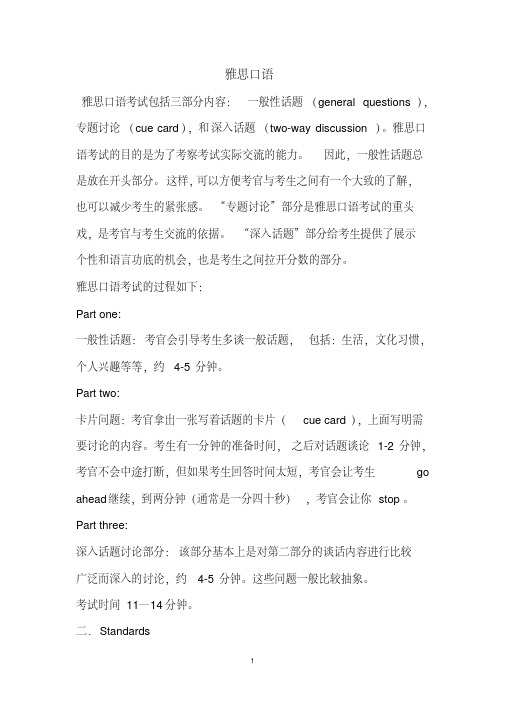
雅思口语雅思口语考试包括三部分内容:一般性话题(general questions),专题讨论(cue card),和深入话题(two-way discussion)。
雅思口语考试的目的是为了考察考试实际交流的能力。
因此,一般性话题总是放在开头部分。
这样,可以方便考官与考生之间有一个大致的了解,也可以减少考生的紧张感。
“专题讨论”部分是雅思口语考试的重头戏,是考官与考生交流的依据。
“深入话题”部分给考生提供了展示个性和语言功底的机会,也是考生之间拉开分数的部分。
雅思口语考试的过程如下:Part one:一般性话题:考官会引导考生多谈一般话题,包括:生活,文化习惯,个人兴趣等等,约4-5分钟。
Part two:卡片问题:考官拿出一张写着话题的卡片(cue card),上面写明需要讨论的内容。
考生有一分钟的准备时间,之后对话题谈论1-2分钟,考官不会中途打断,但如果考生回答时间太短,考官会让考生go ahead继续,到两分钟(通常是一分四十秒),考官会让你stop。
Part three:深入话题讨论部分:该部分基本上是对第二部分的谈话内容进行比较广泛而深入的讨论,约4-5分钟。
这些问题一般比较抽象。
考试时间11—14分钟。
二.Standards1. Pronunciation (发音)2. Grammatical range and accuracy(语法掌握量与运用准确性)3. Lexical resource(词汇资源)4. Fluency and coherence(流利程度与连贯性)三.Mistakes1. dialects and accents2. Grammatical(1)He and she(2)Tense(3)Verb--noun(4)a sentence without a verb(5)一句话里面能同时连用两个动词吗?(6)你能使用复杂句式吗?如果想考高分的话,复杂句式的使用是必不可少的。
雅思口语全方位复习讲义精华.pptx

Writing Travel
advertisemen ts Films
第13页/共69页
(二)雅思口语第一部分是怎么进行的?
雅思口语第一部分提问模式非常固定,考官主要是按照下面几种模式想考生提问:
1. Do you…? 2.Do people in your country do…? 3.What type of …do you like? 4.What type of …do you dislike? 5.What do you like about…? 6.What do you dislike about…? 7.What do you like to do +时间? 8.What do you dislike to do +时间? 9.Is it easy/difficult/convenient/safe/dangerous to do…? 10.When did you first do …? 11.Did you do…when you were a child? 12.When did you last do …? / Tell me about your last …experience? 13.When and where do you…? 14.Do you like do…alone or with friends? 15.Do you prefer A or B? Why? 16.Do you think it’s necessary/important for children/schools to
Is food safety a serious problem in your country? Do schools and universities provide healthy food for students in your country?
雅思口语讲义

环球雅思口语讲义Part1一、学习或工作题在Part1中一开始考官就会问Do you work?或Are you a student?根据你的身份进行回答。
Your work1.What job do you do?What is the nature of that work?I’m working in a private company as a clerk./as an accountant.Need to be patient/assertive(自信)I need to be self-confidentIt’s boring/stagnant无聊2.Why did you choose to do that job(or,that kind of work)?It’s a highly respected job.It gives me quick promotion.Expose myself.Keep abreast of new trend.It offers me promising future.3.What skills do you need for that job?QualificationsSkills:communication skills4.Which is more important to you,co-operating with others at work,or the work itself?It increases the efficiency.Individualist------co-operate5.Which do you enjoy more,working or studying?见下面的学习题6.Would you like to change your job?I like to start my own business in the future.in the computer field.I feel stable/settled.Your Studies1.What subject(s)are you studying?I’m doing...(major)Positive answer:I’m studying Business Management at Renmin University.”I find business is a fascinating world to explore.I am studying hard and hopefully one day I’ll become a successful businessman.Negative answer:I’m doing laws at Renmin University.It’s…(非常无聊,不是自己选的,对它没什么兴趣…)Neutral answer:我在北京大学读艺术专业。
雅思口语内部资料(修订版)第4部分
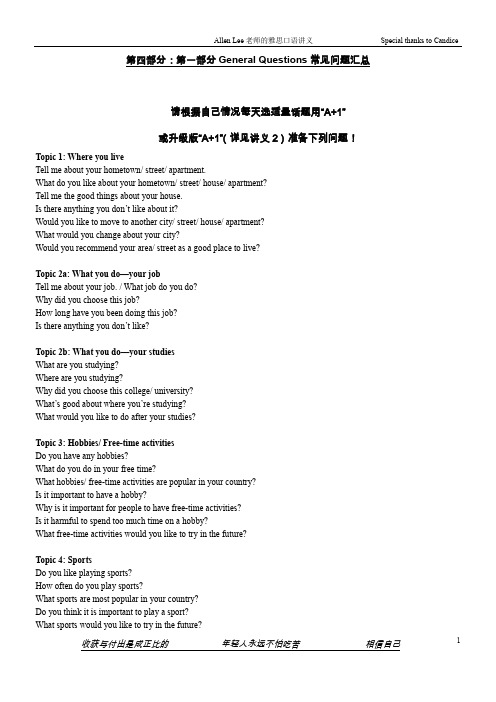
第四部分:第一部分General Questions常见问题汇总请根据自己情况每天选适量话题用“A+1”或升级版“A+1”(详见讲义2)准备下列问题!Topic 1: Where you liveTell me about your hometown/ street/ apartment.What do you like about your hometown/ street/ house/ apartment?Tell me the good things about your house.Is there anything you don’t like about it?Would you like to move to another city/ street/ house/ apartment?What would you change about your city?Would you recommend your area/ street as a good place to live?Topic 2a: What you do—your jobTell me about your job. / What job do you do?Why did you choose this job?How long have you been doing this job?Is there anything you don’t like?Topic 2b: What you do—your studiesWhat are you studying?Where are you studying?Why did you choose this college/ university?What’s good about where you’re studying?What would you like to do after your studies?Topic 3: Hobbies/ Free-time activitiesDo you have any hobbies?What do you do in your free time?What hobbies/ free-time activities are popular in your country?Is it important to have a hobby?Why is it important for people to have free-time activities?Is it harmful to spend too much time on a hobby?What free-time activities would you like to try in the future?Topic 4: SportsDo you like playing sports?How often do you play sports?What sports are most popular in your country?Do you think it is important to play a sport?What sports would you like to try in the future?Do you prefer watching or playing sports?Topic 5: TelevisionDo you like watching TV?How much time do you spend watching TV?When do you usually watch TV?What types of TV programme do you like watching?What types of TV programme are popular in your country?Why do children like watching TV?Topic 6: MusicDo you like listening to music?What types of music do you like listening to?Where do you usually listen to music?Can you play any musical instruments?Do you think it’s important for children to learn to play a musical instrument? Do you prefer listening to live performances or recorded music?Topic 7: ReadingDo you like reading?How often do you read?What do you like to read?Where do you usually read?Do you read for pleasure or to get information?Topic 8: EmailHow often do you use email?What do most people in your country use email for?What are the advantages of email?Are there any disadvantages?Do you think that email will replace letter-writing?Topic 9: Listening EnglishHow long have you been learning English?What do you find difficult learning English?What advice would you like give to someone starting to learn English? Would you like to learn another language in the future?Topic 10: WritingHow often do you writing something by hand?What types of things do you usually write by hand?Do you think it is important to have good handwriting?What are the advantages of writing something by hand?Topic 11: ClothesWhat types of clothes do you like wearing?Where do you usually buy your clothes?Did you wear a school uniform when you were younger?What can we learn about a person from the clothes that they wear?Topic 12: School(that you went to when you were younger—Not your current school) Tell me about a school that you went to when you were younger. What did you like about that school?What subject did you like best at that school?What would you like to change about that school?Topic 13: RestaurantsHow often do you eat out in restaurants?What types of restaurants do you like best?What types of restaurants are common in your city?What are the advantages of eating out in restaurants?Topic 14: FriendsHow much time do you spend with your friends?What do you usually do with your friends?Do you prefer spending time with your family or friends?Is friendship important to you?Topic 15: FestivalsDo you often celebrate festivals in your culture?What do people usually do during festivals?Which is your favourite festival?Do you think festivals are important?Topic 16: Meeting new peopleDo you often meet new people?In your country where can you meet new people?How easy is it to meet new people in your city?Is it possible to meet people from other countries where you live?Topic 17: The seaHave you spent much time near the sea?What do people usually do when they visit the sea?Why do people like spending time near the sea?Would you like to live near the sea?Topic 18: ComputersHow do you use computers?In what ways do people us computers in your country?How did you learn to use a computer?How much have computers changed your life?Topic 19: Collecting thingsHave you ever collected anything?What things do people collect in your country?Why do people like collecting things?Would you like to start collecting something new in the future?Topic 20: DancingDo you like dancing?What kinds of dancing are popular in your country?Is traditional dancing popular among young people in your country? What kind of dancing do people like watching?Topic 21: Learning languagesWhat languages do you speak?Do you think it’s important to learn a foreign language?What languages are spoken in your country?Would you like to learn another language in the future?Topic 22: WeatherWhat’s the weather like where you live?What do you do when the weather is bad?What type of weather do you like best?Would you like to have that type of weather all year round?Topic 23: HappinessWhat kinds of things make you happy?What do you do if you feel unhappy?Is unhappiness always a bad thing?Topic 24: ShoppingDo you like shopping?How often do you go shopping?What kind of shops are there in the area where you live?What’s the worst thing about shopping?Topic 25: FilmsDo you like watching films?What types of film do you like watching?How often do you watch films?Do you prefer watching films at home or at the cinema?Would you like to be in a movie?Topic 26: WeekendsWhat do you usually do at the weekend?What do people usually do at weekends in your country?Do you think your weekends are long enough?How important do you think it is to have free time?Topic 27: Going out in the eveningHow often do you go out in the evening?Who do you usually spend your evening with?When you go out in the evening what do you usually do?Do you think there is enough to do in the evening in your city?Topic 28: AnimalsDo you like animals?What types of animals do people keep as pets in your country? How do most people feel about animals in your country?What are animals used for in your country?Topic 29: RoutinesWhat time do you usually get up in the morning?Are you weekday and weekend routines different?What’s your favourite time of day?What’s the worst part of the day for you?Topic 30: FamilyTell me about your family.What kind of things do you and your family do together?What does the housework in your family?Would you prepfer to have a larger or smaller family?Topic 31: CookingCan you cook?Who usually does the cooking in your family?How do people usually learn to cook in your country?What are the advantaged of being able to cook?Topic 32: WeddingsHave you ever been to a wedding?What do people usually do at weddings in your country?What clothes do people usually wear at weddings in your country? Which people are usually invited to weddings?Topic 33: Public transportWhat types of public transport can be found in your city?What type of public transport do you use most?Are there any public transport problems in your city?How would you improve the public transport system in your city?\Topic 34: TravellingHow much travelling have you done?Do you prefer travelling alone or in a group?When you visit new places, what do you like to do?What places would you like to visit in the future?Topic 35: NamesDo you like your name?Does your name have any special meaning?Who usually choose babied’ names in your country?Would you like ever change your name?Topic 36: FoodWhat food do you like eating?Is there any food that you don’t like?What food is popular in your country?Is fast food popular in your country?Topic 37: BirthdaysHow are birthdays usually celebrated in your country?What gifts do people receive on their birthdays in your country?Do people eat special food on their birthdays in your country?Which birthday is most important in your culture?Topic 38: SeasonsTell me about the seasons in your country?What is your favourite season?Do the seasons affect people’s behaviour?Topic 39: BirdsAre there many birds where you live?How do people in China feel about birds?Do birds have any special meaning in your culture?Should we protect birds?Topic 40: PhotographyDo you like taking photography?Is photography ppopular in your country?What kinds of photography do you like looking at?Would you prefer to buy a postcard or take a photography of a new place?Topic 41: FlowersDo you like flowers?On what occasions do people give flowers in your culture?Do any flowers have a special meaning in your culture?Topic 42: BuildingsWhat types of buildings are there in your city?Do you prefer old or new buildings?Are historical buildings important?Would you like to live in an old building?Topic 43: RainDo you like Rain?What do you usually do when it rains?How do people feel about rain where you live?What do you think is worse, too much rain or not enough rain?Topic 44: MseumsDo you like museums?How often do you visit museums?What types of museum can be found in your country?Why are museums important?Topic 45: RelaxationWhat do you usually do to relax?How much time do you usually have to relax?What do people usually do to relax in your country?Do you think it’s important for people to relax?Topic 46: CyclingDo you like cycling?Is cycling popular in your country?What are the advantaged of cycling?How often do you walk to places?Topic 47: Healthy eatingDo you like eating healthy food?Is fast food popular in your country?Do you think people eat healthier food nowadays compared with people in the past?Topic 48: HotelsDo you like staying in hotels?How often do you stay in hotels?What types of hotels can be found in your city/country?What are the advantaged of staying in a hotels?Topic 49: Outdoor activityDo you like doing outdoor activities?How often do you do outdoor activites?What outdoor activities are popular in your country?Do you think it’s important for people to spend time outdoors?Topic 50: Memories of the pastDo you like to think about the past?How do you feel when other people talk about their memories? Do you keep photographs to remind you of past events?What can people learn from the past?Topic 51: ChildhoodDid you have a happy childhood?What part of your childhood do you remember most?What makes a happy childhood?What would you like to change about your childhood?Topic 52: ColoursWhat is your favourite colour?What can we learn about a person from the colour they wear? Do any colours have s special meaning in your culture?。
(完整版)雅思口语内部资料(修订版)第2部分
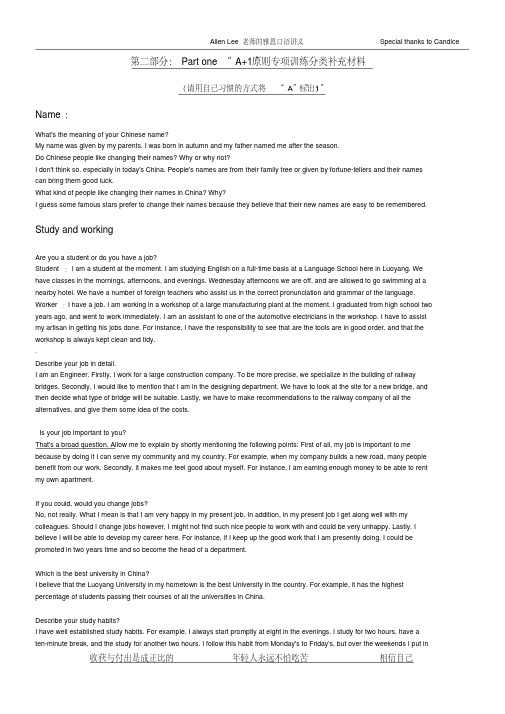
Allen Lee 老师的雅思口语讲义Special thanks to Candice收获与付出是成正比的年轻人永远不怕吃苦相信自己第二部分:Part one “A+1”原则专项训练分类补充材料(请用自己习惯的方式将“A ”“1”标出)Name :What's the meaning of your Chinese name?My name was given by my parents. I was born in autumn and my father named me after the season.Do Chinese people like changing their names? Why or why not?I don't think so, especially in today's China. People's names are from their family tree or given by fortune-tellers and their names can bring them good luck.What kind of people like changing their names in China? Why?I guess some famous stars prefer to change their names because they believe that their new names are easy to be remembered. Study and workingAre you a student or do you have a job?Student :I am a student at the moment. I am studying English on a full-time basis at a Language School here in Luoyang. We have classes in the mornings, afternoons, and evenings. Wednesday afternoons we are off, and are allowed to go swimming at a nearby hotel. We have a number of foreign teachers who assist us in the correct pronunciation and grammar of the language.Worker :I have a job. I am working in a workshop of a large manufacturing plant at the moment. I graduated from high school two years ago, and went to work immediately. I am an assistant to one of the automotive electricians in the workshop. I have to assist my artisan in getting his jobs done. For instance, I have the responsibility to see that are the tools are in good order, and that the workshop is always kept clean and tidy..Describe your job in detail.I am an Engineer. Firstly, I work for a large construction company. To be more precise, we specialize in the building of railway bridges. Secondly, I would like to mention that I am in the designing department. We have to look at the site for a new bridge, and then decide what type of bridge will be suitable. Lastly, we have to make recommendations to the railway company of all the alternatives, and give them some idea of the costs.Is your job important to you?That's a broad question. Allow me to explain by shortly mentioning the following points: First of all, my job is important to mebecause by doing it I can serve my community and my country. For example, when my company builds a new road, many people benefit from our work. Secondly, it makes me feel good about myself. For instance, I am earning enough money to be able to rent my own apartment.If you could, would you change jobs?No, not really. What I mean is that I am very happy in my present job. In addition, in my present job I get along well with my colleagues. Should I change jobs however, I might not find such nice people to work with and could be very unhappy. Lastly, I believe I will be able to develop my career here. For instance, if I keep up the good work that I am presently doing, I could be promoted in two years time and so become the head of a department.Which is the best university in China?I believe that the Luoyang University in my hometown is the best University in the country. For example, it has the highest percentage of students passing their courses of all the universities in China.Describe your study habits?I have well established study habits. For example, I always start promptly at eight in the evenings. I study for two hours, have a ten-minute break, and the study for another two hours. I follow this habit from Monday's to Friday's, but over the weekends I put in。
Conversations雅思口语课程学习讲义

Part One : Question & Answer 问答式话题讨论Hometown家乡1.Where do you come from Could you tell me something about hometown2.Where are you from / How long have you lived there3.Where do you live now What are the advantages and disadvantages of living there4.What places would you recommend a visitor to go to in your city / hometown5.Have recent social changes created any problems in the place you live in6.What changes have you seen in the past few years in your town7.What kind of landscape surrounds your hometown what is the climate like in your hometown/What is the weather like in your hometown8.What are the main places of interest in your hometown?Leisure Activities/ Hobbies 休闲活动及兴趣爱好1.What do you do in your spare time2.What are your spare time interests/hobbies3.How do you spend your leisure time4.How do you spend your weekends /What do you like doing at the weekend5.Do you like reading What kind of books do you read6.What is your favorite sport What are the rules7.Do you often read newspapers Which ones do you read8.Do you often go to the cinema/ theatre9..10.What kind of films do you like best11.Do you often watch TV What id your favorite program12.What kind of music do you enjoy13.Who is your favorite film star Will you describe him/her to me14.How do people usually spend their free time in your countryAmbitions雄心1.Do you have any ambitions2.If you could start your life again, would you do anything different3.What do you see yourself doing in ten years’ time4.·5.Have you ever thought to have your own business What kind of business do you hope to have6.How do you want to develop your careerFuture Plan未来规划1.What are your plans for your future2.What are your plans on your returning to Chins3.What do you intend to do after you finish studyingLiving/Studying Abroad在国外生活及学习1.Do you want to study abroad2.、3.Which country do you intend to go to4.What are you going to study / What do you intend to study5.What are you going to major in6.Which university are you going to study at7.Have you been admitted by the university you apply for8.What is your research proposal all about9.Why do you want to study abroad10.What will be your main problem when you are studying in a foreign country11.Some Chinese students feel that overseas students get preferential treatment. What is your opinion12.What kind of culture shocks do you think will be probably encountered in western world How willyou overcome them13.¥14.What problems can you foresee in the future when you come back to ChinaEducation教育1.Say something about your educational background. /Can you tell me a little about your educationalbackground2.What is your major / How do you like it3.What subjects did you study at university Do you think they are useful in preparing you for yourfuture work4.Which is the best university in your country5.Could you sum up your own study habits in a few points6.Do you think the subjects you are studying today are relevant to present-day society Why`Campus Life校园生活1.Can you say something about your school life2.Could you tell me something about your campus life3.What impressed you most when you were at university4.What are the best and the worst memories you have of your primary or secondary school days5.Did you ever take part-time jobs when studying at university6.Do you think it’s a good idea for full-time students to take part-time jobsLanguage语言学习1.》2.What aspect of English do you find the most difficult3.Do you think foreign language learning is important4.Do you think you will be able to cope with the English-language demands of your intendedprogram5.How do you think language should be learned6.How many foreign languages can you speakCity 城市生活1.How do you like Shanghai Compare it to your hometown.2.What do you think about the city you live in3.What place do you like best in Shanghai/Beijing4.*5.What places in Shanghai/Beijing should a foreigner visit6.If you had the choice, where would you choose to live inTraveling旅行见闻1.Do you like/enjoy traveling Where have you been to2.Which country/place would you most like to visit3.Which parts of China would you recommend a foreigner to visit4.Have you ever been to another country Where did you go5.Which is the best place you’ve been to in China/ Which place do you like best6.^7.What do you like to do when you visit an unfamiliar placeHouse and Home生活居所1.What’s the house like you live in now How do you feel about it2.Could you describe your home3.If you were given a choice, what sort of house would you like to live in why4.Could you describe the traditional architecture of your countryCooking烹饪1.Do you enjoy cooking2.*3.Who does most of the shopping / cooking in your family4.What is the favorite food in your familyFriendship友谊1.Do you have a lot of friends2.What does friendship mean to you3.What kind of people do you make friends with4.What would you do if your next door neighbor were noisy nearly all the time Part Two : Description描述性话题讨论>1.2.34.5、6.7.8.9.10.11./ 12.·13.14.15.16.17.:18.19.20.21.22.~ 23.24.25.26.27.# 28.29.30.31.32.《33.34.35.36.37.\ 38.39.40.41.42.~ 43.44.45.46.47.48.49.50.51.52.53.54.55.56.57.58.59.60.61.62.63.64.65.66.67.68.69.70.71.72.73.74.75.76.77.78.79.80.81.82.83.84.85.86.87.88.< 89.90.91.92.93.94.95.96.97.98.99.100.。
雅思口语讲义
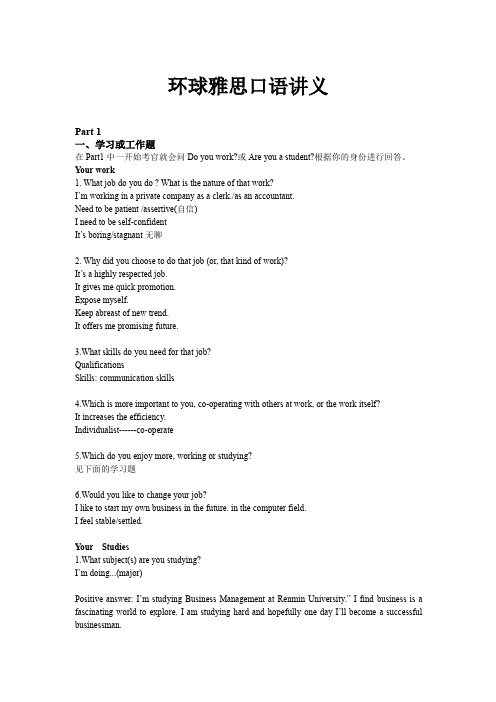
环球雅思口语讲义Part1一、学习或工作题在Part1中一开始考官就会问Do you work?或Are you a student?根据你的身份进行回答。
Your work1.What job do you do?What is the nature of that work?I’m working in a private company as a clerk./as an accountant.Need to be patient/assertive(自信)I need to be self-confidentIt’s boring/stagnant无聊2.Why did you choose to do that job(or,that kind of work)?It’s a highly respected job.It gives me quick promotion.Expose myself.Keep abreast of new trend.It offers me promising future.3.What skills do you need for that job?QualificationsSkills:communication skills4.Which is more important to you,co-operating with others at work,or the work itself?It increases the efficiency.Individualist------co-operate5.Which do you enjoy more,working or studying?见下面的学习题6.Would you like to change your job?I like to start my own business in the future.in the computer field.I feel stable/settled.Your Studies1.What subject(s)are you studying?I’m doing...(major)Positive answer:I’m studying Business Management at Renmin University.”I find business is a fascinating world to explore.I am studying hard and hopefully one day I’ll become a successful businessman.Negative answer:I’m doing laws at Renmin University.It’s…(非常无聊,不是自己选的,对它没什么兴趣…)Neutral answer:我在北京大学读艺术专业。
Conversations雅思口语课程学习讲义

C o n v e r s a t i o n s雅思口语课程学习讲义(总24页)--本页仅作为文档封面,使用时请直接删除即可----内页可以根据需求调整合适字体及大小--Part One : Question & Answer 问答式话题讨论Hometown家乡1.Where do you come from Could you tell me something about hometown2.Where are you from / How long have you lived there3.Where do you live now What are the advantages and disadvantages of livingthere4.What places would you recommend a visitor to go to in your city / hometown5.Have recent social changes created any problems in the place you live in6.What changes have you seen in the past few years in your town7.What kind of landscape surrounds your hometown what is the climate like in yourhometown/ What is the weather like in your hometown8.What are the main places of interest in your hometownLeisure Activities/ Hobbies 休闲活动及兴趣爱好1.What do you do in your spare time2.What are your spare time interests/hobbies3.How do you spend your leisure time4.How do you spend your weekends /What do you like doing at the weekend5.Do you like reading What kind of books do you read6.What is your favorite sport What are the rules7.Do you often read newspapers Which ones do you read8.Do you often go to the cinema/ theatre9.What kind of films do you like best10.Do you often watch TV What id your favorite program11.What kind of music do you enjoy12.Who is your favorite film star Will you describe him/her to me13.How do people usually spend their free time in your countryAmbitions雄心1.Do you have any ambitions2.If you could start your life again, would you do anything different3.What do you see yourself doing in ten years’ time4.Have you ever thought to have your own business What kind of business do youhope to have5.How do you want to develop your careerFuture Plan未来规划1.What are your plans for your future2.What are your plans on your returning to Chins3.What do you intend to do after you finish studyingLiving/Studying Abroad在国外生活及学习1.Do you want to study abroad2.Which country do you intend to go to3.What are you going to study / What do you intend to study4.What are you going to major in5.Which university are you going to study at6.Have you been admitted by the university you apply for7.What is your research proposal all about8.Why do you want to study abroad9.What will be your main problem when you are studying in a foreign country10.Some Chinese students feel that overseas students get preferential treatment.What is your opinion11.What kind of culture shocks do you think will be probably encountered in westernworld How will you overcome them12.What problems can you foresee in the future when you come back to China Education教育1.Say something about your educational background. /Can you tell me a little aboutyour educational background2.What is your major / How do you like it3.What subjects did you study at university Do you think they are useful inpreparing you for your future work4.Which is the best university in your country5.Could you sum up your own study habits in a few points6.Do you think the subjects you are studying today are relevant to present-daysociety WhyCampus Life校园生活1.Can you say something about your school life2.Could you tell me something about your campus life3.What impressed you most when you were at university4.What are the best and the worst memories you have of your primary orsecondary school days5.Did you ever take part-time jobs when studying at university6.Do you think it’s a good idea for full-time students to take part-time jobs Language语言学习1.What aspect of English do you find the most difficult2.Do you think foreign language learning is important3.Do you think you will be able to cope with the English-language demands of yourintended program4.How do you think language should be learned5.How many foreign languages can you speakCity 城市生活1.How do you like Shanghai Compare it to your hometown.2.What do you think about the city you live in3.What place do you like best in Shanghai/Beijing4.What places in Shanghai/Beijing should a foreigner visit5.If you had the choice, where would you choose to live inTraveling旅行见闻1.Do you like/enjoy traveling Where have you been to2.Which country/place would you most like to visit3.Which parts of China would you recommend a foreigner to visit4.Have you ever been to another country Where did you go5.Which is the best place you’ve been to in China/ Which place do you like best6.What do you like to do when you visit an unfamiliar placeHouse and Home生活居所1.What’s the house like you live in now How do you feel about it2.Could you describe your home3.If you were given a choice, what sort of house would you like to live in why4.Could you describe the traditional architecture of your countryCooking烹饪1.Do you enjoy cooking2.Who does most of the shopping / cooking in your family3.What is the favorite food in your familyFriendship友谊1.Do you have a lot of friends2.What does friendship mean to you3.What kind of people do you make friends with4.What would you do if your next door neighbor were noisy nearly all the time Part Two : Description描述性话题讨论1.2.34.56.7.8.9.10.11.12.13.14.15.16.17.18.19.20.21.22.23.24.25.26.27.28.29.30.31.32.33.34.35.36.37.38.39.40.41.42.43.45.46.47.48.49.50.51.52.53.55.56.57.58.60.61.62.63.65.66.67.68.70.71.72.73.75.76.77.78.80.81.82.83.84.85.86.87.88.89.90.91.92.93.94.95.96.97.98.99.100.。
雅思口语课件完整课件

考生需要准备一些有关家庭和朋友的话题,例如家庭成员、家庭氛围、朋友关系、社交 活动等。在回答时,考生应注重描述自己与家人和朋友的关系,以及在这些关系中自己
的角色和感受。
旅行和休闲活动
总结词
旅行和休闲活动是雅思口语考试中常见的话题,主要考察考生对于旅游和娱乐方面的兴趣和表达能力 。
详细描述
考生需要准备一些有关旅行和休闲活动的话题,例如喜欢的旅游目的地、旅游经历、休闲活动等。在 回答时,考生应注重表达自己的兴趣和感受,同时注意使用生动的语言和细节来描述自己的经历。
学习和工作
总结词
学习和工作是雅思口语考试中常见的话题,主要考察考生对于学习和职业方面 的思考和表达能力。
详细描述
考生需要准备一些有关学习和工作的话题,例如喜欢的学科、学习方式、工作 经历、职业规划等。在回答时,考生应注重表达自己的思考和见解,同时注意 使用正确的语法和词汇。
家庭和朋友
总结词
家庭和朋友是雅思口语考试中常见的话题,主要考察考生对于人际关系和社交生活的表 达能力。
描述一个你尊敬的人
要点二
详细描述
我最尊敬的人是我的父亲。他是一个非常聪明、勤奋和有 爱心的人。他总是鼓励我去追求自己的梦想,并为我提供 支持和指导。他也是一个非常负责任的人,无论在工作还 是家庭中都尽职尽责。他的品质和行为一直是我学习和成 长的榜样。我非常感激他对我所做的一切,也希望自己能 够成为像他一样优秀的人。
流利表达
在回答问题时保持流利,避免 长时间的停顿或重复。
语法准确
注意语法的准确性,避免常见 的语法错误。
时间控制
合理分配时间
根据题目的要求,合理分配每个部分的时间 ,避免超时或时间不足。
练习计时
雅思口语课件完整课件

这部分主要考察考生的语言运用 和交流能力。
02
口语基础能力训练
语音语调训练
总结词
语音语调是口语表达中非常重要的一部分,正确的语音语调可以增强表达的清 晰度和流畅度。
详细描述
在雅思口语考试中,语音语调的训练包括发音、语调、重音和停顿等方面的练 习。考生可以通过模仿英语母语者的发音,参加口语课程或找专业的英语教师 进行指导来提高自己的语音语调水平。
第三部分:模拟练习题目及答案解析
模拟练习题目1
描述一次你克服困难的经历
模拟练习题目2
描述一次你错过的事情
答案解析
答案应描述你遇到的困难、你是如何克服 的以及这个经历对你的影响,同时要注意 表达你的毅力和决心。
答案解析
答案应描述你错过的事情的具体情况、原 因以及你的感受,同时要注意表达你的遗 憾和反思。
尽量用简短的语言表达自 己的观点,避免冗长和复 杂的句子。
突出重点
在回答问题时,要突出重 点,让考官更容易理解和 记住你的回答。
表达观点技巧
清晰表达
在表达观点时,要确保自 己的思路清晰,语言流畅 ,避免出现语法错误和词 汇错误。
举例说明
可以通过举例说明自己的 观点,让考官更好地理解 你的想法和思路。
04
口语考试模拟练习
第一部分:模拟练习题目及答案解析
01
模拟练习题目1:自我介绍
02
答案解析:答案应包括姓名、年龄、职业、兴趣爱好等基本信息,同 时要注意表达清晰、流畅。
03
模拟练习题目2:描述一个你熟悉的地方
04
答案解析:答案应描述该地方的位置、特点、给你的感觉等,同时要 注意使用具体的细节和例子来支持你的描述。
雅思口语内部资料(修订版)第9部分
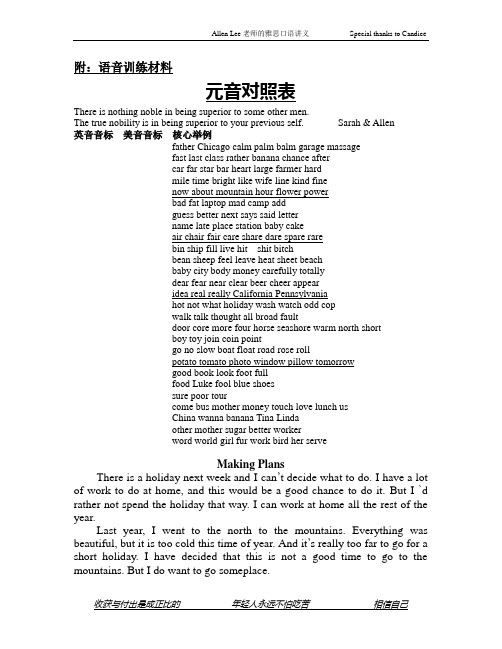
附:语音训练材料元音对照表There is nothing noble in being superior to some other men.The true nobility is in being superior to your previous self. Sarah & Allen英音音标美音音标核心举例father Chicago calm palm balm garage massagefast last class rather banana chance aftercar far star bar heart large farmer hardmile time bright like wife line kind finenow about mountain hour flower powerbad fat laptop mad camp addguess better next says said lettername late place station baby cakeair chair fair care share dare spare rarebin ship fill live hit shit bitchbean sheep feel leave heat sheet beachbaby city body money carefully totallydear fear near clear beer cheer appearidea real really California Pennsylvaniahot not what holiday wash watch odd copwalk talk thought all broad faultdoor core more four horse seashore warm north shortboy toy join coin pointgo no slow boat float road rose rollpotato tomato photo window pillow tomorrowgood book look foot fullfood Luke fool blue shoessure poor tourcome bus mother money touch love lunch usChina wanna banana Tina Lindaother mother sugar better workerword world girl fur work bird her serveMaking PlansThere is a holiday next week and I can’t decide what to do. I have a lot of work to do at home, and this would be a good chance to do it. But I `d rather not spend the holiday that way. I can work at home all the rest of the year.Last year, I went to the north to the mountains. Everything was beautiful, but it is too cold this time of year. And it’s really too far to go for a short holiday. I have decided that this is not a good time to go to the mountains. But I do want to go someplace.英语辅音训练单词表(核心辅音)1.元音:year work far short north horse word world辅音:rose road right tomorrow right rain ring raise river really room rest2.Is this seat taken? Why said thanks?My father and mother have went through thick and thin together for 33 years.It’s the same thing. Through three trees.3.shore sunshine shit ship sheep she shirkable shop sheetSally sells seashells by the seashore.measure treasure vision decision usually casual4.Cheese church much such lunch such a good idea 注意:trees & cheeseJudge join jeep just joy enjoy tears of joy5 普通:two ten too tight time today mountain美音特色:better water little city water photo Shut up get up put it in get out of here a lot of变态T: certainly moutain written Manhattan6.School world feel lady killer telephone million really big girl in a worldtell him7Thank you very much very well wife five overweight英语发音音变规律(美式)世界上本没有路,走的人多了,也就成了路所谓的音变就是语感,就是单音基础扎实,熟练后水到渠成的语音现象。
雅思口语讲义课件
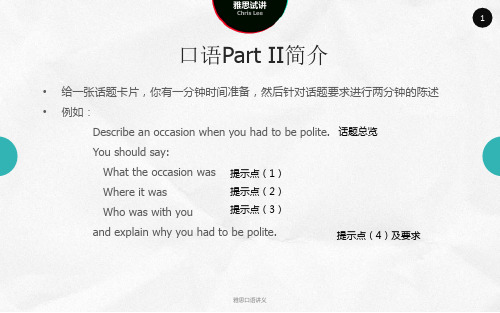
雅思试讲
Chris Lee
9
两分钟开始了!
• 带着你的关键词:Car(not moto/bicycle), Minicooper, Blue Medium Size, Fashionable, Attracting, Expensive, cannot buy now, convenience, show off, safety
• 套用背好的开头! • It has been my dream car since I saw the movie “The Italian Job” two year ago,
in which Mini Cooper is the biggest star. • 接着串关键词! • I would choose a car rather than a motor or bicycle because cars are perfect
雅思口语讲义
雅思试讲
Chris Lee
11
就快成功了!
• This feeling of independence, and the freedom to go where I please, is one of the reasons why I would like to own a Mini. More importantly, it’s a BMW, which earns its name by the safety performance. Together with its exquisite and classical looks, that’s why I would want a Mini Cooper.
• 两分钟结束
雅思口语讲义
雅思口语讲义
雅思口语知识点讲义
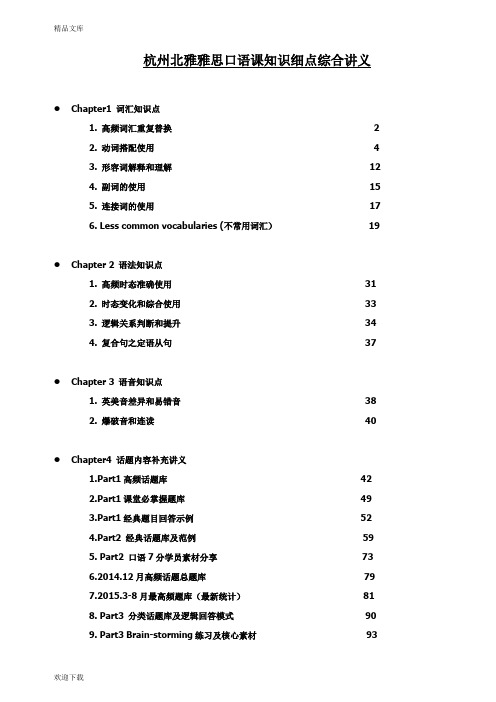
杭州北雅雅思口语课知识细点综合讲义●Chapter1 词汇知识点1. 高频词汇重复替换 22. 动词搭配使用 43. 形容词解释和理解124. 副词的使用155. 连接词的使用176. Less common vocabularies (不常用词汇)19●Chapter 2 语法知识点1. 高频时态准确使用312. 时态变化和综合使用333. 逻辑关系判断和提升344. 复合句之定语从句37●Chapter 3 语音知识点1. 英美音差异和易错音382. 爆破音和连读40●Chapter4 话题内容补充讲义1.Part1高频话题库422.Part1课堂必掌握题库493.Part1经典题目回答示例524.Part2 经典话题库及范例595. Part2 口语7分学员素材分享736.2014.12月高频话题总题库797.2015.3-8月最高频题库(最新统计)818. Part3 分类话题库及逻辑回答模式909. Part3 Brain-storming练习及核心素材93Chapter 1词汇知识点:1.1高频重复词汇替换(5.5-6)1.1. 减少语言停顿和加强自然度,需增加语言填充词(language fillers)e.g. actually/ in fact/as a matter of fact/truth be told /to tell the truthto be frank/honest with you = honestly/frankly speakingpersonally speaking/from my own perspectives/from my point of view as far as I know/concerned减少最常用词汇重复Yes-definitely/undoubtedly/without a doubt indeedprecisely sure/certainly I do suppose/think soNo -I don't think/suppose so/I suppose not Not reallyNot at all/ a bit I'm not sure really/I'm not exactly that sure negativethink - suppose assume I’d hazard a guess that … reckonsuggest maintain/insist hold the point that believe arguelike -be fond of be into be keen on (5.5)be fascinated by be fanatical about be obsessed with (6-6.5)appeal to I cannot imagine stopping doing sth reallyI was brought up with sth in blood (7)don’t likedislike hate cannot stand sth.be not (the least bit )interested in sth.loathe doing sth disapprove of sth. sth. is not kind of my thing.but - however whereas instead while yetbecausedue to because of since/ as/ for owing toone of the reasons is that one illustration of this case is that../this case can be illustrated by.... ..... is responsible for the case ....leads to/results in....beautifulfantastic awesome fabulous fascinating gorgeousstunning breath-taking eye-catching appealing glamorous dedicatefeel bad: gutted /terrified/panic/ awful/ downcast/depressed/upset /devastatedbad traffic: heavy/dreadful/congested/chaotic/gridlockedSth is bad: detrimental/ pernicious/harmful/hazardous/negative side...interesting &exiting&happyenjoyable entertaining be a great fun enchantingthrilling exhilarating sth put(s) sb in a good mood sth. lift(s) your mood知识点作业:回答以下问题时请使用以上单词,不重复问题中的词汇.1)Do you like your city/living place?2)Is there anything you don’t like in your c ity?3)Do you think taking trips/photos is interesting ?4) Do you think listening to the music is important?2.动词搭配使用(5.5-6)2.1. 动宾搭配使用,减少错误搭配动词和宾语是5.5-6分口语基础;比如: 做家务,做头发,做礼物,做蛋糕,做菜都是同一个中文动词,可英文中选择正确的搭配,分别是:do housework, do one’s hair, make a handm ade gift, make a cake, cook a meal,下面提供更多搭配使用例子(特别注意动词部分):Collocations ListsThe following is the page where you can find a few short lists of collocations to give you more of an idea about them.Some common verbshave do makehave a drink have a good time have a haircut have a holiday have a problem have a relationship have a resthave sympathy do businessdo someone a favourdo the cookingdo the shoppingdo the washing updo your bestdo your hairdo your homeworkmake a differencemake a messmake a mistakemake a noisemake an effortmake furnituremake moneymake progressmake troubletake break catchtake a breaktake a chancetake a looktake a resttake a seattake an examtake notestake someone's placetake someone's temperature break a habitbreak a legbreak a promisebreak a recordbreak someone's heartbreak the icebreak the lawbreak the news to someonebreak the rulescatch a buscatch a chillcatch a coldcatch a thiefcatch firecatch sight ofcatch someone's attentioncatch someone's eyecatch the flupay save keeppay a finepay attentionpay by credit cardpay interestpay someone a compliment pay someone a visitpay the billpay the price save electricitysave energysave moneysave one's strengthsave someone a seatsave someone's lifesave something to a disksave spacekeep a diarykeep a promisekeep a secretkeep an appointmentkeep calmkeep controlkeep in touchkeep someone's placeCome go getcome closecome complete with come directcome early/late/on time come first/second/last come into viewcome preparedcome to a compromise come to a decision come to an agreement come to an endcome to a standstill come to terms with come to a total of go abroad/overseasgo astraygo badgo baldgo bankruptgo blindgo crazy/madgo darkgo deafgo fishinggo missinggo out of businessgo quietgo sailinggo to wargo yellowget a jobget a shockget angryget divorcedget drunkget frightenedget homeget lostget marriedget nowhereget permissionget pregnantget startedget the impressionget the sackget upset/worriedget wetSome less common verbsmake time forrun out of time save timespare time spend some time take your time time goes bygo bankruptgo into partnership make a loss make a profit bear in mindbreak off negotiations cease tradingchair a meetingclose a deal/ a meeting come to the point dismiss an offerdraw a conclusion draw your attention to launch a new product take on/lay off staff2.2 动词+介词+宾语搭配使用很多动词是非及物动词,要有固定的介词搭配名词;以下为最常用动词和介词搭配使用,需熟练掌握;Verbs with ‘for’∙He apologised for being late. You can also ‘apologise to someone’∙I applied for the job but I didn’t get it.∙She spent many years caring for her aged parents.∙I can’t go out t onight because I have to prepare for my interviewtomorrow.With ‘from’∙This spray should protect you from mosquitoes.∙Has he recovered from his illness yet?∙He won an award because he saved someone from drowning.∙I am suffering from hay fever.With ‘in’∙She believes in ghosts.∙Our company specialises in computer software.∙You have to work hard if you want to succeed in life.With ‘of’∙I don’t approve of your language, young man.∙Our dog died of old age.∙This shampoo smells of bananas.With ‘on’∙The film is based on the novel by Boris Pasternak.∙If you make so much noise I can’t concentrate on my work.∙Come on! We’re relying on you!∙We don’t agree on anything but we’re good friends.With ‘to’∙Can I introduce you to my wife?∙Please refer to the notes at the end for more information.∙Nobody responded to my complaint.With ‘with’∙I agree with everything you’ve said.∙My secretary will provide you with more information if you need it.∙I have just come up with an new idea that might interest you.知识点2作业练习:熟悉并会使用更多雅思口语高频动词介词固定搭配表达,下划线部分为更高分表达。
雅思口语知识点讲义
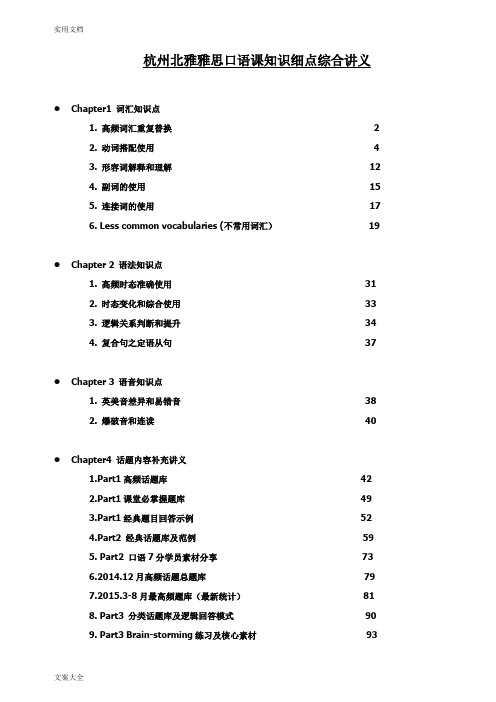
杭州北雅雅思口语课知识细点综合讲义●Chapter1 词汇知识点1. 高频词汇重复替换 22. 动词搭配使用 43. 形容词解释和理解124. 副词的使用155. 连接词的使用176. Less common vocabularies (不常用词汇)19●Chapter 2 语法知识点1. 高频时态准确使用312. 时态变化和综合使用333. 逻辑关系判断和提升344. 复合句之定语从句37●Chapter 3 语音知识点1. 英美音差异和易错音382. 爆破音和连读40●Chapter4 话题内容补充讲义1.Part1高频话题库422.Part1课堂必掌握题库493.Part1经典题目回答示例524.Part2 经典话题库及范例595. Part2 口语7分学员素材分享736.2014.12月高频话题总题库797.2015.3-8月最高频题库(最新统计)818. Part3 分类话题库及逻辑回答模式909. Part3 Brain-storming练习及核心素材93Chapter 1词汇知识点:1.1高频重复词汇替换(5.5-6)1.1. 减少语言停顿和加强自然度,需增加语言填充词(language fillers)e.g. actually/ in fact/as a matter of fact/truth be told /to tell the truthto be frank/honest with you = honestly/frankly speakingpersonally speaking/from my own perspectives/from my point of view as far as I know/concerned减少最常用词汇重复Yes-definitely/undoubtedly/without a doubt indeedprecisely sure/certainly I do suppose/think soNo -I don't think/suppose so/I suppose not Not reallyNot at all/ a bit I'm not sure really/I'm not exactly that sure negativethink - suppose assume I’d hazard a guess that … reckonsuggest maintain/insist hold the point that believe arguelike -be fond of be into be keen on (5.5)be fascinated by be fanatical about be obsessed with (6-6.5)appeal to I cannot imagine stopping doing sth reallyI was brought up with sth in blood (7)don’t likedislike hate cannot stand sth.be not (the least bit )interested in sth.loathe doing sth disapprove of sth. sth. is not kind of my thing.but - however whereas instead while yetbecausedue to because of since/ as/ for owing toone of the reasons is that one illustration of this case is that../this case can be illustrated by.... ..... is responsible for the case ....leads to/results in....beautifulfantastic awesome fabulous fascinating gorgeousstunning breath-taking eye-catching appealing glamorous dedicatefeel bad: gutted /terrified/panic/ awful/ downcast/depressed/upset /devastatedbad traffic: heavy/dreadful/congested/chaotic/gridlockedSth is bad: detrimental/ pernicious/harmful/hazardous/negative side...interesting &exiting&happyenjoyable entertaining be a great fun enchantingthrilling exhilarating sth put(s) sb in a good mood sth. lift(s) your mood知识点作业:回答以下问题时请使用以上单词,不重复问题中的词汇.1)Do you like your city/living place?2)Is there anything you don’t like in your city?3)Do you think taking trips/photos is interesting ?4) Do you think listening to the music is important?2.动词搭配使用(5.5-6)2.1. 动宾搭配使用,减少错误搭配动词和宾语是5.5-6分口语基础;比如: 做家务,做头发,做礼物,做蛋糕,做菜都是同一个中文动词,可英文中选择正确的搭配,分别是:do housework, do one’s hair, make a handmade gift, make a cake, cook a meal,下面提供更多搭配使用例子(特别注意动词部分):Collocations ListsThe following is the page where you can find a few short lists of collocations to give you more of an idea about them.Some common verbshave do makehave a drink have a good time have a haircut have a holiday have a problem have a relationship have a resthave sympathy do businessdo someone a favourdo the cookingdo the shoppingdo the washing updo your bestdo your hairdo your homeworkmake a differencemake a messmake a mistakemake a noisemake an effortmake furnituremake moneymake progressmake troubletake break catchtake a breaktake a chancetake a looktake a resttake a seattake an examtake notestake someone's placetake someone's temperature break a habitbreak a legbreak a promisebreak a recordbreak someone's heartbreak the icebreak the lawbreak the news to someonebreak the rulescatch a buscatch a chillcatch a coldcatch a thiefcatch firecatch sight ofcatch someone's attentioncatch someone's eyecatch the flupay save keeppay a finepay attentionpay by credit cardpay interestpay someone a compliment pay someone a visitpay the billpay the price save electricitysave energysave moneysave one's strengthsave someone a seatsave someone's lifesave something to a disksave spacekeep a diarykeep a promisekeep a secretkeep an appointmentkeep calmkeep controlkeep in touchkeep someone's placeCome go getcome closecome complete with come directcome early/late/on time come first/second/last come into viewcome preparedcome to a compromise come to a decision come to an agreement come to an endcome to a standstill come to terms with come to a total of go abroad/overseasgo astraygo badgo baldgo bankruptgo blindgo crazy/madgo darkgo deafgo fishinggo missinggo out of businessgo quietgo sailinggo to wargo yellowget a jobget a shockget angryget divorcedget drunkget frightenedget homeget lostget marriedget nowhereget permissionget pregnantget startedget the impressionget the sackget upset/worriedget wetSome less common verbsmake time forrun out of time save timespare time spend some time take your time time goes bygo bankruptgo into partnership make a loss make a profit bear in mindbreak off negotiations cease tradingchair a meetingclose a deal/ a meeting come to the point dismiss an offerdraw a conclusion draw your attention to launch a new product take on/lay off staff2.2 动词+介词+宾语搭配使用很多动词是非及物动词,要有固定的介词搭配名词;以下为最常用动词和介词搭配使用,需熟练掌握;Verbs with ‘for’∙He apologised for being late. You can also ‘apologise to someone’∙I applied for the job but I didn’t get it.∙She spent many years caring for her aged parents.∙I can’t go out tonight because I have to prepare for my interviewtomorrow.With ‘from’∙This spray should protect you from mosquitoes.∙Has he recovered from his illness yet?∙He won an award because he saved someone from drowning.∙I am suffering from hay fever.With ‘in’∙She believes in ghosts.∙Our company specialises in computer software.∙You have to work hard if you want to succeed in life.With ‘of’∙I don’t approve of your language, young man.∙Our dog died of old age.∙This shampoo smells of bananas.With ‘on’∙The film is based on the novel by Boris Pasternak.∙If you make so m uch noise I can’t concentrate on my work.∙Come on! We’re relying on you!∙We don’t agree on anything but we’re good friends.With ‘to’∙Can I introduce you to my wife?∙Please refer to the notes at the end for more information.∙Nobody responded to my complaint.With ‘with’∙I agree with everything you’ve said.∙My secretary will provide you with more information if you need it.∙I have just come up with an new idea that might interest you.知识点2作业练习:熟悉并会使用更多雅思口语高频动词介词固定搭配表达,下划线部分为更高分表达。
